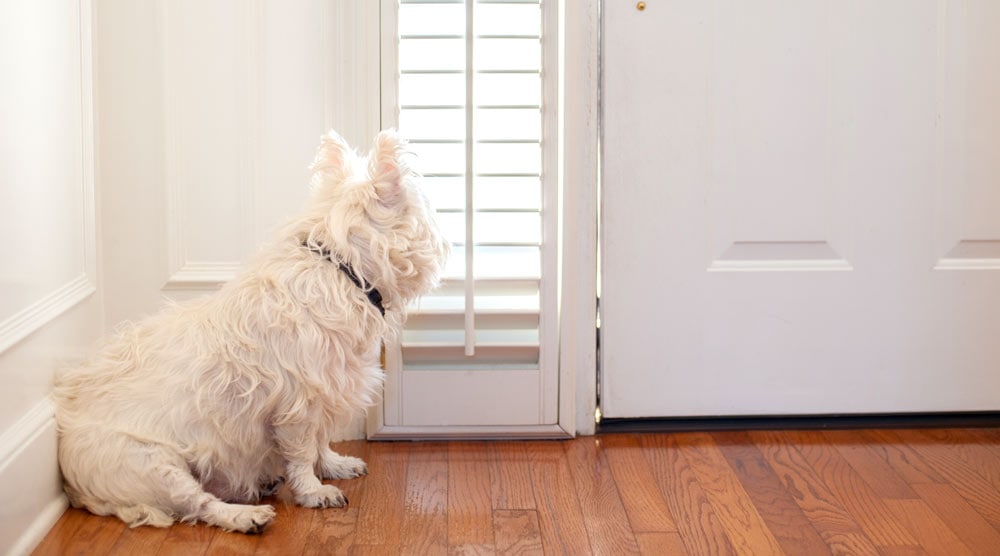Does your dog scratch at the door? This behavior is an indication of anxiety, frustration or boredom, but it can be prevented with the right techniques.
Contents
Thankfully, scratching can often be prevented by identifying the underlying cause of the behavior and solving it. Keep reading to find out how.
Step 1: Identify the Underlying Cause
There are two primary reasons dogs scratch or jump at doors.
The first is because they want to go outside. This may be to go to the bathroom, to investigate a sight or sound, to play, or, in the case of dogs that aren’t altered, to find a mate.
On the other hand, scratching at the door is also a common sign of anxiety. This is usually separation anxiety (your dog is scratching because they become anxious when left alone), but it could also be caused by thunder, vacuum cleaners, house guests or a variety of other triggers.
So, how do you tell the difference between the two reasons?
If your dog scratches the door you’ve exited after you leave, it’s probably an anxiety issue. Some dogs become distressed when left alone, and scratching this specific door is a sign they are trying to get to you. Other symptoms of separation anxiety include destroying furniture, whining, barking, trembling and submissive urination.
A dog that’s bored or needs to go to the toilet will probably scratch the door connected to the garden or yard. They often won’t scratch immediately after you leave, but instead to show you they want to go outside. They may also scratch at night.
Step 2: Protect Your Door as a Short-Term Solution
Addressing the underlying cause of scratching is essential, but this can take time. This is especially true for an anxious dog who may not be supervised when they’re scratching, making training even more difficult.
In the meantime, it’s a good idea to protect your door from further damage.
Door protectors are a straightforward solution for most homes. These are clear plastic shields that protect wood, glass or PVC doors from scratching and jumping. For screen doors, rescreen the door with heavy duty pet screen.

Step 3: Address the Cause of Scratching
As I mentioned, the solution to door scratching depends on the underlying reason. Here’s how to address the two most common causes: wanting to go outside and separation anxiety.
If Your Dog Wants to Go Outside (Or Come Back Inside)
There are many reasons your dog might want to go outside. Boredom, needing to go to the toilet and investigating noises or smells are amongst the most common, but the first step is to work out why your dog is unsettled.
Before you can start preventing scratching, however, you need to avoid reinforcing the habit. If your dog scratches to go outside, never let him out until he stops. If he scratches to get attention, ignore him until he’s sitting calmly. It’s almost impossible to stop your dog scratching if you’re giving him signals that the behavior works – and even giving in occasionally can be confusing for your pet.
For the other motivations to go outside, you have several options:
- If you have a safe, enclosed outdoor space and don’t mind your dog going in and out at their leisure, you can install a dog door. Doggie doors are great for providing more freedom and allowing your pet to go to the toilet whenever they want.
- If you don’t have an outdoor space, or just prefer to monitor your pet, you can teach your dog to ring bells as a non-destructive way to let you know that they want to go out. This won’t help when you’re away, but can reduce the chances of scratching if you’re at home.
- If your dog is scratching due to boredom, try providing mentally stimulating toys, such as stuffed Kongs or chew toys. Longer walks and less time spent alone are also important for relieving boredom.
- You may also want to consider doggy daycare, hiring a dog walker or taking your dog to work so they aren’t home alone for long periods.
Note: If your dog is not altered, you may want to consider getting it done. This alone could be enough to stop the scratching (and probably other unwanted behaviors as well) because it eliminates the biological imperative to go and make more dogs.
If Your Dog Is Suffering from Anxiety
If anxiety is the cause of scratching, you’ll need to address the anxiety itself rather than the symptoms. This isn’t always a quick process, but it’s essential for your pet’s wellbeing.
Start by making sure your dog has a safe space that’s accessible at all times. This is usually a crate, which has the added convenience of being a place where the dog can be secured when needed.
For separation anxiety, you then need to teach your dog it’s not a big deal when you leave, and you’ll always come back.
The process of relieving separation anxiety can be quite involved and is beyond the scope of this article, but the goal is to gradually build up the time you spend away from your dog before he becomes anxious. This requires patience, repetition and a gradual increase in difficulty that doesn’t push your pet too far, otherwise the problem could become worse.
For this reason, I recommend discussing your dog’s separation anxiety with a professional dog trainer who specialises in positive reinforcement training. He or she will be able to provide you with a plan for making your dog less anxious when you leave, without rushing the process.
Summary
Door scratching can be a frustrating habit, but it’s usually preventable. It’s important to understand why your dog is scratching, however, as this affects the methods you should use to solve the problem.
In the meantime, ask any questions you have about door scratching or these solutions in the comment section below!


